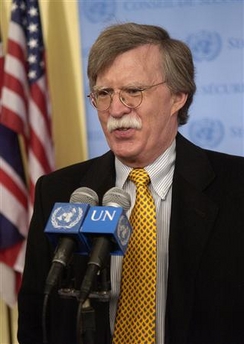Major powers tried to break a U.N. impasse on Iran's nuclear ambitions with a
round of telephone calls among their foreign ministers on Thursday seeking to
produce a unified message, diplomats said.

U.S. Ambassador to the
U.N. John Bolton arrives for a meeting of the U.N. Security Council, at
United Nations headquarters, in New York, March 23, 2006.
[Reuters] |
After two weeks of haggling over an initial U.N. Security Council reaction to
Iran's suspected nuclear program, Britain, France and the United States were
unable to get support from Russia and China, the other two veto-holding Security
Council nations, on a draft statement they had proposed.
U.S. Ambassador John Bolton said talks among foreign ministers of the five
permanent council members were needed before any decisions could be taken in the
15-member Council.
"We're waiting for the outcome of the conversations at higher pay grades,"
Bolton told reporters.
U.S. Secretary of State Condoleezza Rice intends to speak to Russian Foreign
Minister Sergei Lavrov, who has the toughest position, said a senior State
Department official, speaking on condition of anonymity in Washington.
The official said British Foreign Secretary Jack Straw had already spoken to
Lavrov.
The proposed Security Council statement, drawn up by France and Britain,
would tell Iran to suspend uranium enrichment efforts that could produce fuel
for an atomic bomb. Tehran says it nuclear research is for peaceful purposes,
while the West believes it is a cover for bomb making.
In Washington, Rice told reporters, "There is no time for delay in taking up
this issue."
"We need to have this statement and to make clear to the Iranians that the
international community is united in demanding that Iran return to a posture
that is consistent with its international commitments," she said after talks
with Greek Foreign Minister Dora Bakoyanni.
Rice said there was an "an erosion of confidence in Iran "because they lied
to the IAEA for 18 years."
"If they do want a civil nuclear program, that's fine. They can have one but
not with (uranium) enrichment and reprocessing on Iranian territory," Rice said.
"They need to suspend the activities in which they're engaged and return to
negotiations.
Lavrov has made clear the current text would have to be restructured because
it removed the issue from the 35-nation board of the International Atomic Energy
Agency.
"The draft includes points that effectively lay the groundwork for sanctions
against Iran," Lavrov told the Interfax news agency on Wednesday. "We will
hardly be able to support this version."
In Beijing, a spokesman for China's foreign ministry was asked about the
deadlock at the United Nations.
"In making any actions or decisions the concerned parties should be focused
on whether they truly help to reach a lasting resolution of the Iran nuclear
issue, and whether they help the peace and stability of the region," spokesman
Qin Gang said.
"That is why we should give diplomacy more time and more space." he added.
If the talks drag on, Britain and France have considered dropping the idea of
a council statement, which requires agreement by all 15 members. Instead they
would turn the statement into a resolution, which needs nine favorable votes and
no veto.